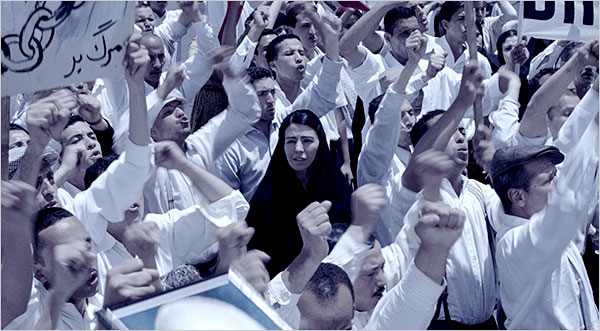|
Reviews of Recent Independent, Foreign, & Documentary Films in Theaters and DVD/Home Video

WOMEN WITHOUT MEN With powerful images, Women Without Men traces the roots of last year’s prominent participation of Iranian women in street protests back to the tumultuous summer of 1953, when American and British forces were staging a coup against the democratically elected Prime Minister Mohammed Mossadegh to return the Shah to power. Early on, a young woman in a chador paces furiously on a roof. Time stops as she steps off to float slowly, and very dramatically, into the film’s realm of magic realism. She is 30-year-old Munis (Shabnam Tolouei), frustrated by her traditional, bullying brother’s orders to marry and to remain indoors, away from the news on the radio. Only as a ghost can she imagine freely listening to the radio at a café or joining the noisy street demonstrations in favor of democracy. Her more traditional friend, Faezeh (Pegah Ferydoni), doesn’t understand her frustration, but then she’s secretly in love with Munis’s brother and longs for nothing more than to marry him. The mysteriously wandering camera finds two other powerless women chafing under men’s restrictions. Fakhri (Arita Shahrzad) is a Westernized wife whose dissatisfaction with her wealthy, uncaring general husband boils over when she hears that an old boyfriend has returned from America, and a prostitute, Zarin (Orsi Toth), breaks free from a brothel, escaping from men’s brutality. Shahrnush Parsipur, who wrote the original novella the script is based on, plays her cruel madam, one of the women who help perpetuate the system. Over several days, these women from different classes and circumstances will continue to face different abuses/misuses at the hands of (fairly one-dimensional) men until they follow a road and then a misty river outside the walls of sepia-tinged Tehran. Their lives eventually converge in a mystical orchard that seems like a desert oasis from ancient tales or Persian poetry, where Fakhri revives Faezeh and Zarin with nourishment, art, and music. But theirs is more a psychological journey of liberation that enables them to escape reality into a mythic dream. But even this feminine sanctuary—like Iran’s short-lived secular democracy—is only temporary. The enchanted cottage is breached, falling into an abandoned stasis that looks a lot like Miss Havisham’s thwarted happiness from Dickens’ Great Expectations. Debut
filmmaker Shirin Neshat is an artist known for her photography and video
installations, and the dreamy set pieces, further enhanced by Ryuichi Sakamoto’s lush
score, are beautiful, shifting from the intensity of political rallies
to the fragility of the secret garden. (The cinematographer is Martin
Gschlacht of Revanche and Lourdes.) The striking
imagery and aching sympathy of Women
Without Men make up for the formulistic relationships and
characterizations. Neshat dedicates it to the memory of those who have
lost their lives seeking freedom in Iran since the beginning of the 20th
century. Nora Lee
Mandel
|

